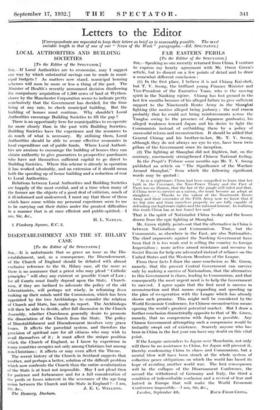DISESTABLISHMENT AND THE ST. HILARY CASE [To the Editor of
the SPECTATOR.] SIR,—It is unfortunate that so grave an issue as the Dis- establishment, and, as a consequence, the Disendowment, of the Church of England should be debated with almost exclusive reference to the St. Hilary case, all the more as there is no assurance that a priest who may plead " Catholic principles " will obey any existent or possible Court of Law ; for all Courts must finally depend upon the State. Church- men, if they are inclined to advocate the policy of the old Liberationists, will perhaps act wisely, in refraining from making up their minds until the Commission, which has been appointed by the two Archbishops to consider the relation of Church and State, has made its report. The Archbishops will then be able to decide, after full discussion in the Church Assembly, whether Churchmen generally desire to promote the dissociation of the Church from the State. The policy of Disestablishment and Disendowment involves very grave issues. It affects the parochial system, and therefore the provision of spiritual care for all citizens who may wish to avail themselves of it ; it must affect the unique position which the Church of England, as I know by experience in many countries occupies not only among Christians but among non-Christians ; it affects or may even affect the Throne.
The recent history of the Church in Scotland suggests that another, and perhaps a better, solution of the difficult problem which now confronts the Church than the entire secularization of the State is at least not impossible. May I not plead then for patience and forbearance and for a full consideration of the perils or losses inherent in the severance of the age-long union between the Church and the State in England ?—I am, The Deanery, Durham. •






























 Previous page
Previous page